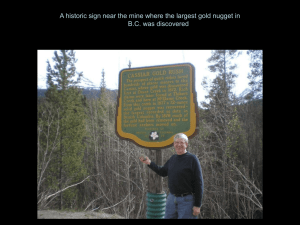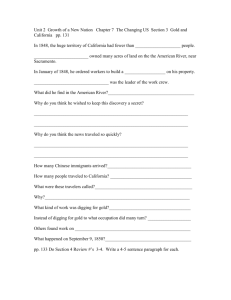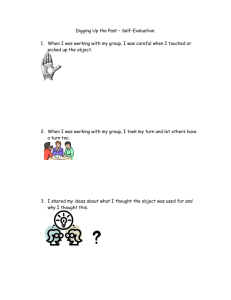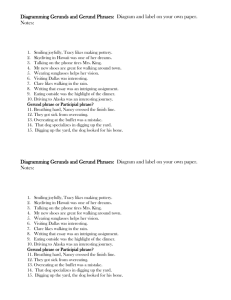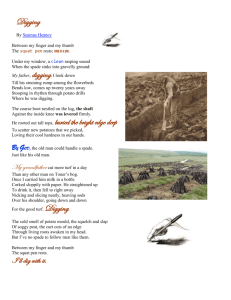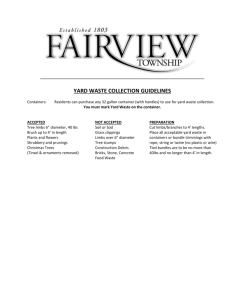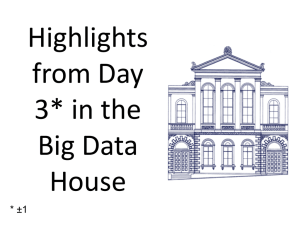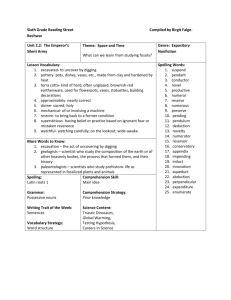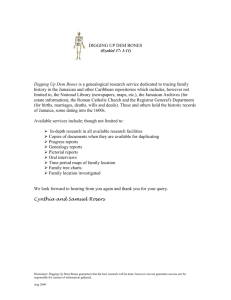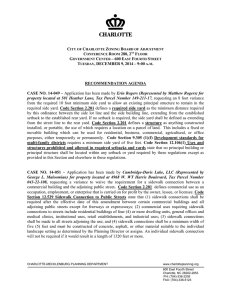Despite Tough Guys, Life Is Not the Only School for Real Novelists
advertisement
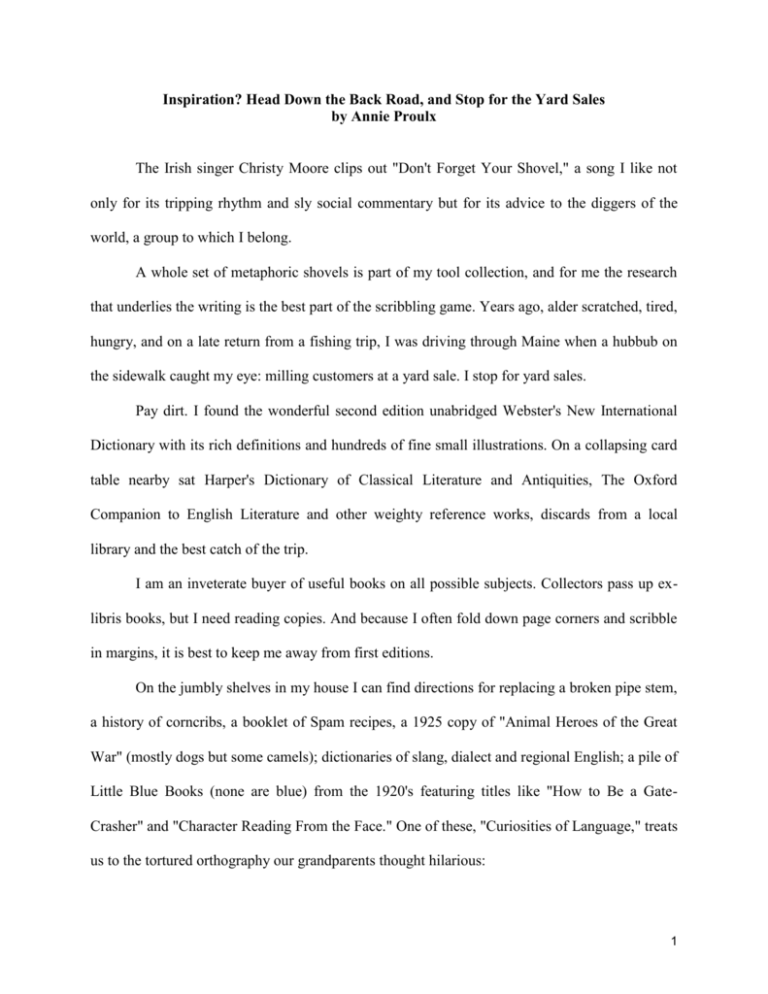
Inspiration? Head Down the Back Road, and Stop for the Yard Sales by Annie Proulx The Irish singer Christy Moore clips out "Don't Forget Your Shovel," a song I like not only for its tripping rhythm and sly social commentary but for its advice to the diggers of the world, a group to which I belong. A whole set of metaphoric shovels is part of my tool collection, and for me the research that underlies the writing is the best part of the scribbling game. Years ago, alder scratched, tired, hungry, and on a late return from a fishing trip, I was driving through Maine when a hubbub on the sidewalk caught my eye: milling customers at a yard sale. I stop for yard sales. Pay dirt. I found the wonderful second edition unabridged Webster's New International Dictionary with its rich definitions and hundreds of fine small illustrations. On a collapsing card table nearby sat Harper's Dictionary of Classical Literature and Antiquities, The Oxford Companion to English Literature and other weighty reference works, discards from a local library and the best catch of the trip. I am an inveterate buyer of useful books on all possible subjects. Collectors pass up exlibris books, but I need reading copies. And because I often fold down page corners and scribble in margins, it is best to keep me away from first editions. On the jumbly shelves in my house I can find directions for replacing a broken pipe stem, a history of corncribs, a booklet of Spam recipes, a 1925 copy of "Animal Heroes of the Great War" (mostly dogs but some camels); dictionaries of slang, dialect and regional English; a pile of Little Blue Books (none are blue) from the 1920's featuring titles like "How to Be a GateCrasher" and "Character Reading From the Face." One of these, "Curiosities of Language," treats us to the tortured orthography our grandparents thought hilarious: 1 There was a young man, a Colonel, Who walked in the breezes volonel; He strolled in the aisles, Of the wooded maisles, And, returning, read in his jolonel. This digging involves more than books. I need to know which mushrooms smell like maraschino cherries and which like dead rats, to note that a magpie in flight briefly resembles a wooden spoon, to recognize vertically trapped suppressed lee-wave clouds; so much of this research is concerned with four-dimensional observation and notation. These jottings go into cheap paper-covered notebooks that I keep in a desultory fashion, more often onto the backs of envelopes and the margins of newspapers, from there onto the floor of the truck or onto the stair landing atop a stack of faxes and bills. The need to know has taken me from coal mines to fire towers, to hillsides studded with agate, to a beached whale skeleton, to the sunny side of an iceberg, to museums of canoes and of windmills, to death masks with eyelashes stuck in the plaster, to shipyards and log yards, old military forts, wildfires and graffiti'd rocks, to rough water and rusty shipwrecks, to petroglyphs and prospectors' diggings, to collapsed cotton gins, down into the caldera of an extinct volcano and, once or thrice in the middle distance, in view of a snouty twister. I listen attentively in bars and cafes, while standing in line at the checkout counter, noting particular pronunciations and the rhythms of regional speech, vivid turns of speech and the duller talk of everyday life. In Melbourne I paid money into the hand of a sidewalk poetry reciter to hear "The Spell of the Yukon," in London listened to a cabby's story of his psychopath brother in 2 Paris, on a trans-Pacific flight heard from a New Zealand engineer the peculiarities of building a pipeline across New Guinea. The grand digging grounds are still the secondhand bookshops. Every trip ends with boxes of books shipped back, dusty old manuals on the hide business or directions for the dances of Texas with footprints and dotted lines reeling across the pages. But bookstores are changing. Recently I rattled the latch of a favorite in Denver before I saw the sign announcing that it was forever closed, but the inventory could be "accessed" on the Internet. Another dealer, a specialist in local histories, operated from his living room for years and put out an interesting catalogue from time to time. Both the catalogue and a visit to his bookshelves are things of the past, rendered obsolete by chilly cyber-lists. I rarely use the Internet for research, as I find the process cumbersome and detestable. The information gained is often untrustworthy and couched in execrable prose. It is unpleasant to sit in front of a twitching screen suffering assault by virus, power outage, sluggish searches, system crashes, the lack of direct human discourse, all in an atmosphere of scam and hustle. Nor do I do much library research these days, though once I haunted the stacks. Libraries have changed. They are no longer quiet but rather noisy places where people gather to exchange murder mysteries. In bad weather homeless folk exuding pungent odors doze at the reading tables. One stands in line to use computers, not a few down for the count, most with smeared and filthy screens, running on creaky software. I mourn the loss of the old card catalogues, not because I'm a Luddite, but because the oaken trays of yesteryear offered the researcher an element of random utility and felicitous surprise through encounters with adjacent cards: information by chance that is different in kind from the computer's ramified but rigid order. 3 This country swims in fascinating pamphlets. In a New Mexico greasy spoon I pick up a flyer that takes St. Paul sharply to task on the subjects of hair style, clothing and women. ("Shorts, miniskirts, halters, bikinis, etc., are all O.K. You don't have to listen to Paul. . . . God wants women to look nice and be in style with the times. As far as men, Jesus had long hair. Paul must have been a religious fanatic.") A hundred miles later I read a narrow sheet with advice on how to behave in the presence of a mountain lion. ("Do not make direct eye contact. . . . Try to appear as big as possible.") Food and regional dishes are important research subjects. Some you can order in restaurants, but others exist only in out-of-print cookbooks and must be prepared at home, like a duck roasted inside a watermelon, a dish called Angel in a Cradle, or another called the Atlanta Special, which sounds like a train, although the ingredient list begins, "1 beaver (8 to 10 pounds.)" I like to drive the West, making a slow drift over caliche and gravel roads, volume cranked up and listening to music (this, too, is research), usually regional subtexts of alternative genres. But two that I never tire of hearing are Glenn Ohrlin singing "Barnacle Bill, the Sailor," in his two-tone voice, and the good ol' boy Texas country-and-western yodeler Don Walser with the Kronos String Quartet, sliding a heartaching "Rose Marie" straight at me. The truck wanders around intersecting roads as tangled as fishing line. At times topographic maps, compass bearings or keeping the sun at my shoulder are better direction guides than signs, usually nonexistent or bullet-blasted into unreadability. The rules of road drift are simple: Always take a branching side route, stop often, get out and listen, walk around, see what you see. And what you see are signs, not direction signs but the others, the personal messages. We live in a world of signs. 4 I am amazed when people mourn the loss of the Burma Shave jingles. Better stuff is all around us, in public restrooms, in phone booths, on rocks, stapled to telephone poles, struck on lawns. I remember a large billboard that stood for many years on a back-country road in Colorado. The community used it as a kind of enormous greeting card, welcoming home a son on leave from the Navy, congratulating a child on her fifth birthday, inviting neighbors to a party. The signs of urban panhandlers seem to indicate that many of them took creative-writing courses. These messages are always printed in neat capital letters: "WILL KILL FOR FOOD," "BIG DUMB UGLY BUM NEEDS YOUR HELP," "MY MOTHER LOVED ME BUT NOW SHE'S GONE." The digging is never done because the shovel scrapes at life itself. It is not possible to get it all, or even very much of it, but I gather what I can of the rough, tumbling crowd, the lone walkers and the voluble talkers, the high lonesome signers, the messages people write and leave for me to read. 5

